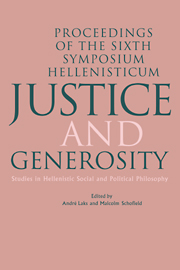 Justice and Generosity
Justice and Generosity Book contents
- Frontmatter
- Contents
- Preface
- Introduction
- PART I POLITICAL PHILOSOPHY: DEVELOPMENT AND TRANSFORMATION
- 1 Polybius' applied political theory
- 2 The statesman and the law in the political philosophy of Cicero
- 3 Aristotelian political theory in the Hellenistic period
- 4 Oikonomia in Hellenistic political thought
- 5 The Cynics and politics
- PART II THE ETHICAL FRAMEWORK OF POLITICS AND SOCIETY
- Bibliography
- General index
- Index of Greek and Latin words
- Index of ancient names and philosophical schools
- Index of passages
4 - Oikonomia in Hellenistic political thought
from PART I - POLITICAL PHILOSOPHY: DEVELOPMENT AND TRANSFORMATION
Published online by Cambridge University Press: 15 October 2009
- Frontmatter
- Contents
- Preface
- Introduction
- PART I POLITICAL PHILOSOPHY: DEVELOPMENT AND TRANSFORMATION
- 1 Polybius' applied political theory
- 2 The statesman and the law in the political philosophy of Cicero
- 3 Aristotelian political theory in the Hellenistic period
- 4 Oikonomia in Hellenistic political thought
- 5 The Cynics and politics
- PART II THE ETHICAL FRAMEWORK OF POLITICS AND SOCIETY
- Bibliography
- General index
- Index of Greek and Latin words
- Index of ancient names and philosophical schools
- Index of passages
Summary
Oikonomikē technē, the art of household management, has not much been studied, so far as the Hellenistic period is concerned. Histories of economic thought, when they refer to ancient thought, usually pass directly from Aristotle or his immediate successors to medieval economic Aristotelianism; even the most recent and up-to-date of these are no exception. It would seem that ancient economic thought, having reached its zenith in Aristotle's Politics, disappeared, only to reappear as a catalyst for the reflections of medieval commentators. However, several post-Aristotelian texts on the topic of oikonomikē exist such as the Economics of Ps.-Aristotle and the so-called Economics of Philodemus of Gadara; from a later age there are the Economics of the Neopythagoreans Callicratides and Bryson, the Economics of Dio of Prusa, the Economics of Hierocles and various other documents which, though not called Economics, are concerned with subjects connected with oikonomikē technē.
As far as I know, a general overview of the subject matter with which I am concerned is not available. Only the products of some of the schools, especially Ps.-Aristotle's Economics, have stimulated a sufficiently wide debate. I would like here to make a comparably broad study of the whole subject, with a view to a comprehensive synthesis.
- Type
- Chapter
- Information
- Justice and GenerosityStudies in Hellenistic Social and Political Philosophy - Proceedings of the Sixth Symposium Hellenisticum, pp. 95 - 128Publisher: Cambridge University PressPrint publication year: 1995
- 12
- Cited by
